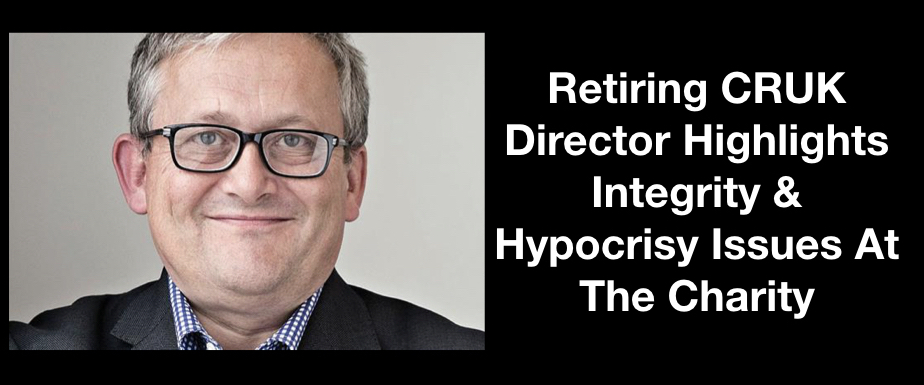
Cancer Research UK’s Director of Fundraising, Ed Aspel, has announced plans to retire at the end of the year. Third Sector interviewed Aspel about leaving the organisation and he revealed his regrets and discussed the changing face of fundraising making comments which highlight both the hypocrisy and the lack of will to tackle ethics and integrity issues at CRUK.
In the interview (which can be read here), Aspel revealed that he would love to have come up with “that one, radical, transformational change that is different from the traditional model…”
Had he done so, it is fair to assume that, given he is in their employ, CRUK would have, rightly, lauded him and made sure he was recognised for the achievement. And, in doing so, they would again reveal the culture of hypocrisy that riddles the charity.
How?
Twenty six years ago, Jim Cowan came up with just such a game changer, just such a transformational change. Jim’s idea was the Race for Life. Twenty six years later, it is easy to forget just what a game changer the creation of the Race for Life was.
In 1993, charity runners entered running events, such as the London Marathon or Great North Run, and asked for sponsorship but there was no such thing as the numerous ‘charity runs’ we have now in 2019. Whereas now almost every charity has its own fun run of one variety or another, 26 years ago none did. Jim creating the Race for Life in 1993 and launching it in1994 changed all that and, with it, the fundraising landscape in the UK changed for good.
You would think that CRUK would have thanked Jim, that they would heap praise and recognition on him.
But no.
Instead, one of their employees stole Jim’s idea and CRUK spent 25 years telling a range of different tales about the events origins before two years ago, in the face of undeniable evidence, they changed tack and declared that they don’t recognise anyone with the event’s creation (but have never corrected the numerous untrue stories they had previously shared).
Hypocrisy? Absolutely.
This same charity happily acknowledge others for fundraising exploits, events, and other enterprises which support their fundraising. But not Jim.
This same charity happily accept recognition for their own executives, employees, and organisation as a whole, but hypocritically refuse to give Jim similar, or even any, recognition for the amazing event he created.
And what of ethics and integrity?
Later in the interview Aspel goes on to talk about how donations to CRUK are falling. He blamed changing attitudes and evolving consumer behaviour, and he may be correct. But isn’t a contributing factor in changing attitudes towards CRUK that they are trusted less?
People are seeing through the glossy adverts and beginning to ask why they are being lied to? Lies such as the frequent lies by omission about entry fees to their events not supporting any research; such as the misleading statements which suggest merchandise sales support research; or the exclusion of their high street shop, event, and merchandising income from how they calculate the percentage of income funding research.
They will happily talk about funds going to Cancer Research UK but challenge them as to how much of those funds actually fund research and the question is greeted with silence.
The charity is an ethics and integrity vacuum which shows no desire to amend its ways and restore faith and trust. Aspel may well be unaware of all of this but as a Director of the organisation, he should not be.
And, given the hypocrisy of CRUK towards recognising Jim Cowan, we can only wonder what Aspel’s stance might be should he be nominated for any form of award or recognition himself for his service to the charity? Recognition still denied to Jim Cowan, a man whose incredible creation played no small part in supporting Aspel’s success as Director of Fundraising.
In the Race 4 Truth, Cancer Research UK are lagging behind.
